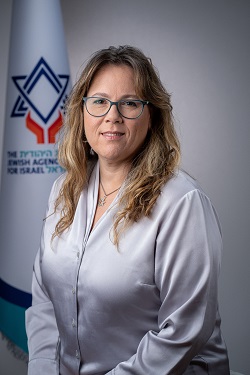09/20/2024
JAFI CEO Discusses Cleveland Partnership, War Response
ABIGAIL PREISZIG | CJN
Article reprinted with permission from Cleveland Jewish News

Ahronoviz
For decades, the Cleveland Jewish community has offered steadfast support for The Jewish Agency for Israel, Amira Ahronoviz, CEO and director general of the agency, told the Cleveland Jewish News on Sept. 11 at the Jewish Federation of Cleveland’s Jack, Joseph and Morton Mandel Building in Beachwood.
Founded in 1929, the organization works to secure a vibrant Jewish future including through providing the global framework for aliyah, ensure global Jewish safety, strengthening Jewish identity and connecting Jews to Israel and one another.
“We are there to be a player for the long term,” Ahronoviz said, meeting with the CJN after a private breakfast with Campaign for Jewish Needs donors. “It’s not only being a touch-and-go provider of resources. We are there to be partners assisting the affected communities and populations over time.”
In the one-on-one meeting, Ahronoviz discussed The Jewish Agency for Israel’s war response and what the Jewish Diaspora can do to help as well as reflected on her relationship with Cleveland and her accomplishments during her 30-year career with the organization as she prepares to step down after serving as CEO for six years.
The Jewish Agency for Israel, a beneficiary organization of the Federation’s Campaign for Jewish Needs, has mobilized to meet the needs of those impacted by the war in Israel through direct relief to those directly affected by the war and its implications, rebuilding communities and providing safety and resilience to Jewish communities around the world, she said.
Direct relief includes direct beneficiaries of The Jewish Agency for Israel like new immigrants residing in the organization’s facilities and absorption center and thousands of old age residence populating more than 40 homes across Israel, she said. They also provide grants, interest free loans and mentorship to small and micro-businesses that have collapsed due to the war.
Its Victim of Terror Fund provides immediate cash grants of $1,000 to civilians affected by terror attacks within 48-hours and provides long-term support for up to three years, Ahronoviz said. The fund, established in 2002, supported 9,000 families in its first 20 years of existence. Since the war began on Oct. 7, 2023, The Jewish Agency for Israel has provided support to an additional 9,000 families.
“We convey to them the fact that they’re not alone and that we’re coming on behalf of the Jewish people to provide them the love and the hug,” she said. “We’re always amazed of how this is moving to them, that so quickly someone comes to care for them.”
To rebuild communities, The Jewish Agency for Israel harnessed the power of world Jewry with partner communities, Ahronoviz said. To strengthen evacuated communities in the South of Israel struggling to rebuild themselves, the organization brought 1,000 youths ages 14 to 16 to experience “respite, joy and hope” at a Jewish summer camp abroad and in return local children had the opportunity to meet Israelis their age and hear their stories.
Due to global spikes in antisemitism following the war, The Jewish Agency for Israel has provided emergency grants and security means to protect and guard hundreds of Jewish institutions across the world, she said.
Additionally, they have strengthened and expanded their global schlichim program to a record 101 schlichim placed in campuses across North America and the world, Ahronoviz said. The schlichim will work together with Hillels, including Cleveland Hillel and Hillel at Kent State University, and local partners on campuses to provide a safe space for Jewish students and act together to combat antisemitism.
“We understand our schlichim has a huge role to play in those communities as well as in campuses where the situation today of safety of Jewish students and resiliency is a critical one,” she said.
Ahronoviz urged Jewish diaspora to “not miss the opportunity for the historic moment to have as many Clevelanders involved actively in Israel and its rebuilding” both in visiting Israel, hosting Israelis, sharing stories, providing resources and addressing unmet needs.
“We need our partners, we need Cleveland, as a community, to be there with us in this way for the long term, having the patience, openness, sensitivity and attentiveness to walk this journey with the populations in need so that we can address, in the right way, their needs,” she said.
During Ahronoviz tenure as CEO, she has addressed many large-scare crises including the pandemic, the Russian-Ukraine war and the war in Israel; she harness and engaged partners during those challenging times to address the huge needs they created; and was constantly receptive to learning and challenging herself and The Jewish Agency for Isreal to promote diversity and enable an atmosphere and culture of innovation, she said.
While she only visited Cleveland for the third time, the trip also served as a farewell and thank you as she prepares to step down from her leadership role, Ahronoviz said. She has met an “endless number of Clevelanders in Israel” and worked with leadership grown from Cleveland, including Michael Siegal and Charles “Chuck” Ratner.
“It’s very unique for me to do that, to have Cleveland be part of that because the Cleveland Jewish community has been such a strong and huge part of my journey and what we’ve done as a Jewish people,” Ahronoviz said.

